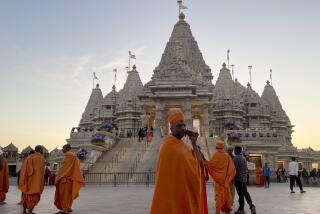Spirits May Motivate Hindu God to Answer One’s Prayers
- Share via
NEW DELHI — Bhairon has different tastes from most other gods in the vast Hindu pantheon. While offerings at temples across India are usually limited to cash, food and flowers, devotees bring this god bottles of Scotch, rum, vodka and moonshine.
Bhairon, viewed as a demon god or an incarnation of the destroyer god Shiva, likes his alcohol. His idol shares a marigold-covered shrine at a temple in New Delhi’s Old Fort area with a statue of Kali, known variously as the goddess of strength, fear, life and death -- even the goddess of a thousand names.
Belief in a booze-loving god is not exceptional in Hinduism, India’s dominant religion, since Hindus can worship any of millions of deities, often described as aspects or focuses of one supreme being. Some gods are fun-loving and wealth-giving, others angry and bloodthirsty.
Ganga Nath, a priest at the small white temple for 40 years, explains why alcohol plays a role at the shrine, but notes that devotees of Bhairon also bring other offerings.
“Bhairon and Kali drink wine in order to get high, but there is no specification made by the temple just for wine,” Nath said.
The temple’s priests have posted signs asking worshippers not to give alcohol to the beggars who gather at the shrine, as they do at most Hindu temples. But here the beggars come not only for the usual alms or food but for the free drinks, which Bhairon devotees -- ignoring the signs -- willingly provide.
Alok Gupta, 31, a recent visitor, says he believes that rum is the best offering to get his prayers answered. After donating some of the liquor to the idols, he emerges from the temple to share the rest with beggars holding out makeshift cups cut from the bottoms of plastic water bottles.
“I give some of the bottle’s content as a blessing to beggars since it has been blessed by the lord,” Gupta said.
Nath says Bhairon has special powers to grant the wishes of devotees and is especially good at driving away poverty.
One devotee, Raghu Chauhan, 43, says he first offered prayers to Bhairon for his ailing mother. “Sure enough, she soon recovered and I’ve been coming to the temple ever since,” he said.
Not everyone brings alcohol. On this day, hundreds of people jostle to receive deep-fried pastries and milk-based sweets from the priests after the offerings are presented to the gods.
Both Bhairon and Kali are depicted with jet black faces and white, bulging eyes, to illustrate the ferocious aspects of their natures.
Many temple visitors buy orange marigold necklaces to hang around the idols. On Sundays, the main worship day for these deities, only the idols’ eyes can be seen above the garlands.Inside, the air is sweet with incense and alcohol. Devotees give liquor bottles to temple helpers, who pour some into a large metal tray between the idols, then hand the rest back to the worshippers. This mixture of alcohol soon becomes a heady cocktail that has earned the nickname “rocket fuel.”
Nath points out that the mixture is not intended for consumption, saying that after the day’s prayers are over, the liquid is discarded in a large pit.
However, the Hindustan Times said recently that the alcohol is not thrown away, but put into bottles and sold by the beggars. Temple workers insist that they know of no such practice. They also say they can do nothing beyond posting signs to stop devotees from offering liquor to the beggars.
“As it is happening outside our temple, we have no control over it,” said Avinash Kumar, a temple helper.
More to Read
Sign up for Essential California
The most important California stories and recommendations in your inbox every morning.
You may occasionally receive promotional content from the Los Angeles Times.










